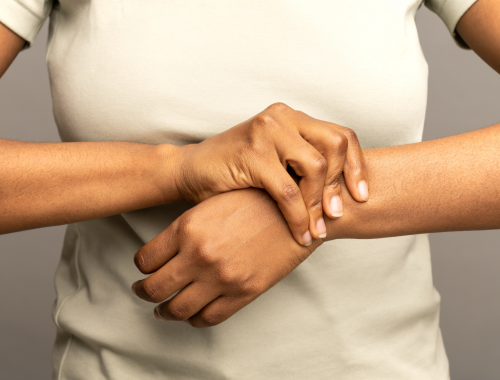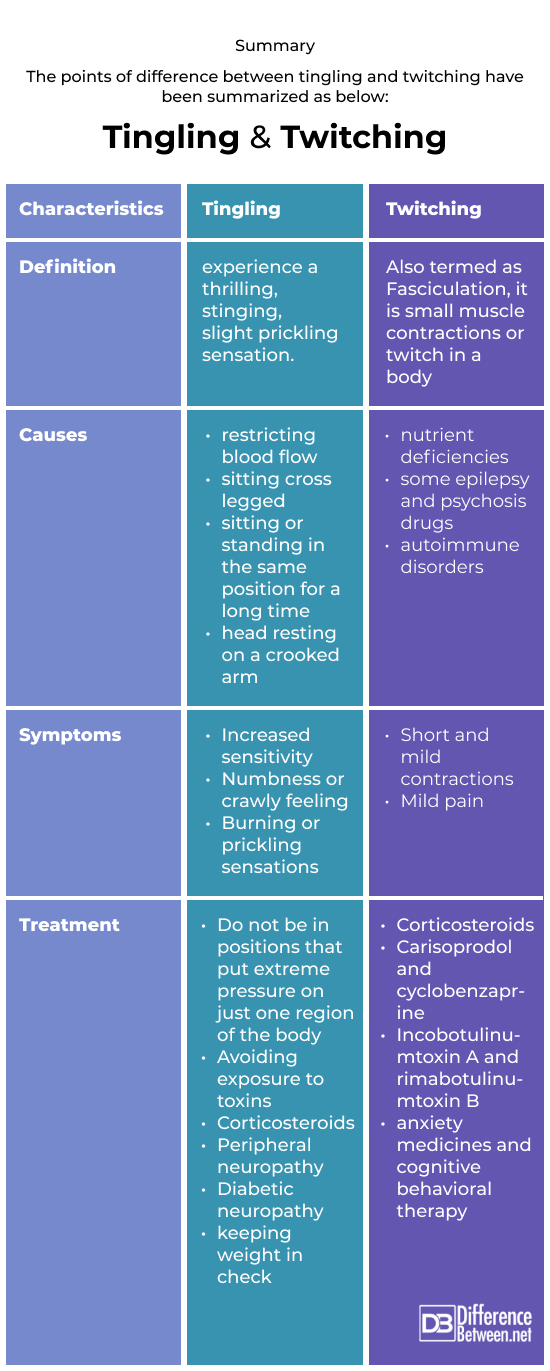Difference Between Tingling and Twitching

What is tingling and twitching?
Tingling is a stinging, slight prickling and pins and needles sensation in the body. It is usually odd but harmless feeling. In some cases, there is indication of a danger signal like carpal tunnel syndrome or diabetic neuropathy. While twitching involves small muscle contractions (shrinking or shortened version) in the body. The body muscles comprise of fibers that are controlled by certain nerves. Any injury that causes damage to a nerve could result in twitching. In most of the cases, twitching goes unnoticed and are not raising any concerns.

Similarity
Tingling could be a symptom of persistent twitching.
Tingling
It is a temporary pricking sensation that usually occurs in hands, feet, arms and legs. It is a condition called paresthesia. It’s a symptom that a muscle nerve is agitated and in discomfort and sending additional signals. This pricking sensation is like a traffic jam in the nervous system.
Twitching
Twitching is also termed as fasciculation. It is defined as a short, Brief, spontaneous contraction (inhibitory responses produced by electrical field stimulation) or twitch in a muscle.
Difference between Tingling and twitching
Definition
Tingling
Pins and needles feeling in arms, legs, hands, and feet. This sensation is caused by sitting in a toilet seat for a long-time restricting blood flow or wearing shoes that are very tight. It could be temporary, permanent or reversible.
Twitching
Twitching is brief, involuntary spontaneous muscle contractions.
Causes
Tingling
- Carpal tunnel syndrome (pressure on a nerve at the wrist)
- Strokes
- Seizures
- Underactive thyroid
- Migraines
- Diabetes
- Multiple sclerosis
- Mini stroke (Transient ischemic attack (TIA))
Twitching
Low magnesium levels, overexertion, side effects of certain medications, dehydration, stress and anxiety and muscle fatigue, stimulants, consuming too much caffeine, nutrient deficiencies, dehydration, nicotine, irritation, electrolyte imbalances and not getting enough sleep.
Other serious causes include
- Muscular dystrophies
- Amyotrophic lateral sclerosis (ALS)
- Spinal muscular atrophy
- Isaac’s syndrome
- Chronic kidney disease (CKD)
- Myopathy
- Serotonin syndrome
- Neuropathy
- Hoffmann syndrome
Symptoms
Tingling
- Pins and needles feeling in arms, feet, hands, and legs
- A feeling of squeezed arteries and nerves that feed blood to the nerve
Twitching
- Sudden uncontrollable movements
- Sleep disorders
- Tingling feeling
Diagnosis
Tingling
The doctor will check your heart, your blood pressure, pulses in your toes and wrists and your nervous system. Based on that he will ascertain if you feel pinpricks and other sensations in your limbs. He will also ask you to get your blood tests done and check for blood sugar and vitamin B12 levels.
Twitching
The doctor will do a physical exam where does the contraction occur, for how long and the symptoms you will be experiencing. He will ask for urine and blood tests to see any infection.
- Magnetic resonance imaging (MRI) or positron emission tomography (PET) scan.
- Electroencephalogram (EEG) to check seizures in the brain
- Electromyography (EMG)
- Computed tomography (CT scan) – a medical imaging technique
Summary
The points of difference between tingling and twitching have been summarized as below:

FAQ
What is tingling and twitching?
Tingling – also called as “paresthesia which is ‘pins and needles’ sensation.
Twitching – brief, spontaneous contraction (abrupt tightening or shortening of muscle) or twitch in a muscle.
What causes muscle twitches and tingling?
Twitches are usually caused by stress and anxiety. Other caused include poor diet, side effects of some medications, lot of caffeine etc. Tingling is caused by sitting or standing in a fixed position for a longer duration of time.
What does tingle feel like?
Tingling is caused by auditory-sensory conversation and are usually abnormal sensations. The sensation could be burning, prickling, or pins and needles sensation.
What does muscle twitching feel like?
Muscle twitching feels like spasms. The fizzles of a twitching muscle feel like kind of unsettling, discomfort, stiffness, and cramps.
Does ALS twitching start in one place?
Yes, it often starts in one place but eventually spreads to other places near that starting place instead of occurring in random areas.
Does twitching mean nerve damage?
When something stimulates (raise levels nervous activity) and damages a nerve, it results in the contraction of the muscle fibers accelerating a twitch.
Is ALS twitching constant?
Yes, the primary type of fasciculation in ALS is constant
When should I worry about nerve twitching?
In most of the cases, twitches aren’t cause for concern. However, you should see doctor if the twitches increase in frequency and are damaging your nerves, causing muscle loss and extreme weakness
Is muscle twitching ALS or anxiety?
Fasciculations or muscle twitching are not alone the symptoms of ALS (Amyotrophic Lateral Sclerosis). Muscle twitching could be caused by anxiety too.
- Difference Between Global Warming and Greenhouse Effect - May 18, 2024
- Difference Between Vaccination and Immunization - March 3, 2024
- Difference Between Selective Mutism and Autism - February 25, 2024
Search DifferenceBetween.net :
Leave a Response
References :
[0]Heskamp, L., Birkbeck, M. G., Whittaker, R. G., Schofield, I. S., & Blamire, A. M. (2021). The muscle twitch profile assessed with motor unit magnetic resonance imaging. NMR in Biomedicine, 34(3), e4466.
[1]Petersson, P., Waldenström, A., Fåhraeus, C., & Schouenborg, J. (2003). Spontaneous muscle twitches during sleep guide spinal self-organization. Nature, 424(6944), 72-75.
[2]Tihanyi, B. T., Ferentzi, E., Beissner, F., & Köteles, F. (2018). The neuropsychophysiology of tingling. Consciousness and cognition, 58, 97-110.
[3]Tihanyi, B. T., & Köteles, F. (2017). Physiological and psychological correlates of attention-related body sensations (tingling and warmth). Physiology International, 104(3), 235-246.
